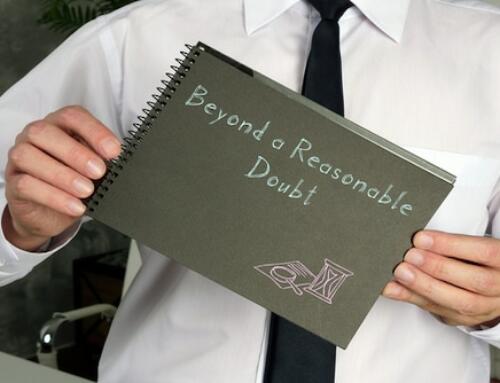If you were pulled over for driving under the influence (DUI) and your blood alcohol concentration (BAC) registered above 0.08 percent, do not make the mistake of assuming that the prosecution has an open-and-shut case. There are several ways to challenge a breathalyzer reading in Pennsylvania, and if your breath test results are unreliable, then they cannot be used against you in court.
When facing a DUI charge in Pennsylvania, it is important that you speak with an attorney as soon as possible. There are both steps you need to take and the mistakes you need to avoid, and you need to begin working on your defense strategy immediately. Depending on the circumstances of your case, some of the defenses your attorney may be able to used to challenge your BAC test results include:
1. You Have a Medical Condition that Skewed Your Test Results
Certain medical conditions, including gastro disorders such as gastroesophageal reflux disease (GERD), having a high volume percentage of red blood cells, and having a high ketone level, can skew breathalyzer test results. If you had a relevant medical condition at the time of your DUI traffic stop, your attorney may be able to argue that your medical condition raises questions about the validity of your BAC reading.
2. You Were on a Certain Type of Medication
Various types of prescription and over-the-counter (OTC) medications can cause a “false positive” breathalyzer test result. Examples of medications that can cause you to register a high BAC include:
- Asthma medications
- Nyquil, Vicks, cough syrups, and other OTC medications
- Oral pain relievers
- Dental medications
3. Failure to Calibrate the Breathalyzer Device
In order to register accurate readings, breathalyzer devices must be subject to regular maintenance, testing, and calibration. If the police failed to properly calibrate the device used for your breath test, or if there are no records to prove that proper calibration was performed, you may have a strong argument against the reliability of your BAC reading.
4. Failure to Properly Administer the Breath Test
Even if a breathalyzer device is properly calibrated, it can still register a faulty reading if the breath test is not administered properly. This requires the arresting officer to be adequately trained on the appropriate use of the device, how and when you are supposed to blow, and issues that can result in faulty BAC readings.
5. Failure to Testify
Under the Sixth Amendment to the U.S. Constitution, you have the undeniable right to confront any witnesses against you. This includes the police officer who administered your breath test. If this officer does not testify in your case, the denial of your opportunity to conduct a cross-examination should cause the results of your breath test to be kept out of your DUI case.
6. Lack of Reasonable Suspicion or Probable Cause
In order to pull you over, the police must have reasonable suspicion that you are (or have been) involved in the commission of a crime. In order to arrest you, they must have probable cause to believe that you are guilty of DUI. If the police lacked reasonable suspicion or probable cause, then any evidence obtained as a result of your DUI traffic stop – including your breathalyzer results – may be constitutionally inadmissible in court.
7. Your BAC Increased After You Were Stopped
It is a scientific fact that a person’s BAC will continue to rise for a significant period of time after he or she is done drinking. Under Pennsylvania law, a person must be “under observation for at least 20 consecutive minutes prior to initial administration of the alcohol breath test.” If it took significantly longer for the police to administer the breathalyzer (as is often the case), then you may be able to argue that your BAC only rose above the legal limit after you were pulled over for DUI.
8. Human Factor Interference
In addition to medical conditions and the consumption of prescription and OTC medications, various other human factors can interfere with the accuracy of breathalyzer test results as well. For example, having a high body temperature can falsely inflate your BAC reading. Your breathing pattern can also affect how the breathalyzer device measures the amount of alcohol in your system. While it may be difficult to prove that you had a fever unless you were on your way home from the doctor’s office when you got pulled over since the prosecution has the burden of proof it is important to assess any potential flaws that you may be able to use to your advantage.
9. Electric or Radio Interference
Similarly, in certain circumstances, it may be possible to call the reliability of your BAC reading into question by alleging that electrical issues or radio frequency interference tainted the results. Once again, while these issues may be difficult to prove, they are potential facts that can help build reasonable doubt in the minds of the jury.
10. Foreign Substances and Environmental Factors
Residue from certain foreign substances can cause the alcohol vapor in your mouth to exceed the level of alcohol exhaled from your lungs resulting in a “false positive” BAC. This includes leftover residue from mouthwash, breath fresheners, toothache medications, and other common products that contain small amounts of alcohol. Recent exposure to paints, varnishes, and other alcohol-based products can result in an inflated BAC reading as well.
Once again, in order to determine which defenses you have available, it is important that you speak with a DUI defense lawyer promptly. Your attorney may need to obtain evidence from the police, your doctor, or other sources, and this requires sufficient time before your case goes to trial.
Schedule a Free DUI Defense Consultation in Philadelphia, PA
To find out what defenses you have available in your DUI case, contact us now to schedule your free initial consultation. Call us 24/7 at 267-758-2228, or tell us how to reach you online and we will be in touch as soon as possible.






